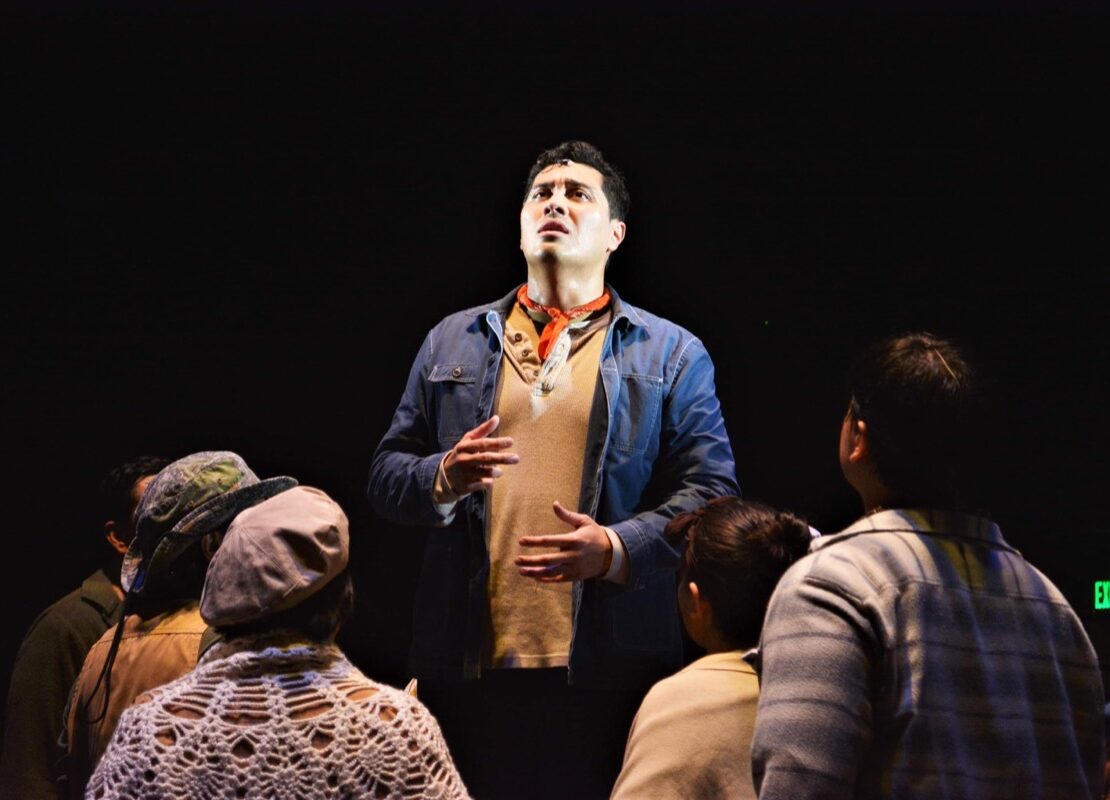One of the highlights of Repertory Philippines’ (REP) 2020 season was supposed to be the staging of the theatre duo composer Richard Rodgers and lyricist-dramatist Oscar Hammerstein II’s classic, “Carousel.” Touted as the greatest musical of the 20th century, a local restaging was expected to be a big feat.
The pandemic completely turned this plan on its head, and now, two years later, REP’s “Carousel” has finally come to fruition, albeit totally and radically different, not just from the theater company’s original plan, but from its source material, too.
Don’t get me wrong; at the core of REP’s “Carousel” are still the same music, story, and characters that Rodgers and Hammerstein created. But what makes this 2022 staging different all boils down to its intention.
Events of recent years have all opened our eyes to more pressing sensibilities, and we have been forced to reckon with outdated mindsets and attitudes. But with a material so deeply entrenched in the old ways of the 20th century, REP’s challenge was not just to make it relevant, but to make it appropriate by modern social standards. Thus they call 2022 “Carousel” a “21st century test of a 20th century text.”
With director and lawmaker Toff De Venecia at the helm of the production, the musical has taken many radical turns for its current iteration on the stage. Running at the Cultural Center of the Philippines’ new Tanghalang Ignacio Gimenez black box theater, the traditionally grandiose is scaled back to only the essentials—a bare stage at the center, with a lone carousel pole to one end. Chairs, boxes, and other small props accent the dialogue, which cues the changes in setting and time. It is visually darker, reflecting the true tone of the piece and what it really talks about beneath its soaring musical numbers, waltzes, and interludes.
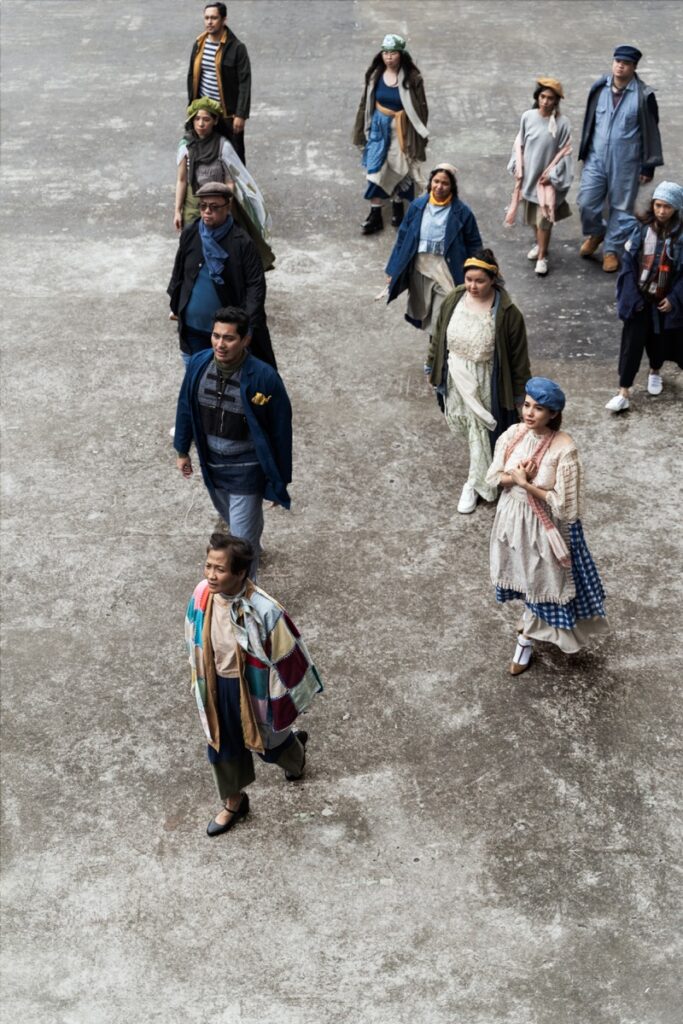
The instrumentation, too, has been reduced from a full orchestra to a two-piano arrangement. But stripped as the music may technically be, musical director Ejay Yatco and his partner pianist, composer and arranger Joed Balsamo deftly ensure the fullness of sound in every scene.
The stripped-down effect, from the set to the music, works in this production’s favor, as it allows the audience to focus on the core of “Carousel”—its characters, their connections, and how their decisions move them along, without all the frills.
Even though the original 40-member cast had to be pared down to a little more than a dozen, the storytelling was not left to suffer, thanks to the balanced vocal arrangements and the skillful work on costumes, which is definitely one of the major things to admire about this version of “Carousel.”
Glorious Dias’ Jodinand Aguillon decks the tight 16-member cast in a creative mix of vintage, ready-to-wear, and archival pieces from REP’s costume vault. As a result, some of the looks carry subtle Filipiniana silhouettes, while others have hints of their Western counterparts’ way of dress. The layering of various pieces also allows the cast—most of whom have to take on several roles throughout the play—to distinguish one character from another at any particular scene.
‘Carousel’ in the age of social media and feminism
Along with more contemporary visuals, REP toes the line here, presenting various allusions to new interpretations of the piece, without outright feeding the audience enough context to piece it together as the play goes. The lines spoken—much unchanged from the 20th century “Carousel”—could make you narrow your eyes or raise an eyebrow, but its delivery is what makes you think, “Ah, it’s not exactly what it literally means.”
Take for example the scene in which Enoch Snow (Lorenz Martinez) catches his bride-to-be Carrie Pipperidge (Mikkie Bradshaw-Volante) in a compromising position with the no-gooder Jigger Craigin (Noel Rayos). The show breaks from tradition, with the cast whipping out their smartphones and turning their cameras onto the couple. An allusion to the publicization of all details of (and subsequent involvement of everyone in) our relationships, thanks to social media.
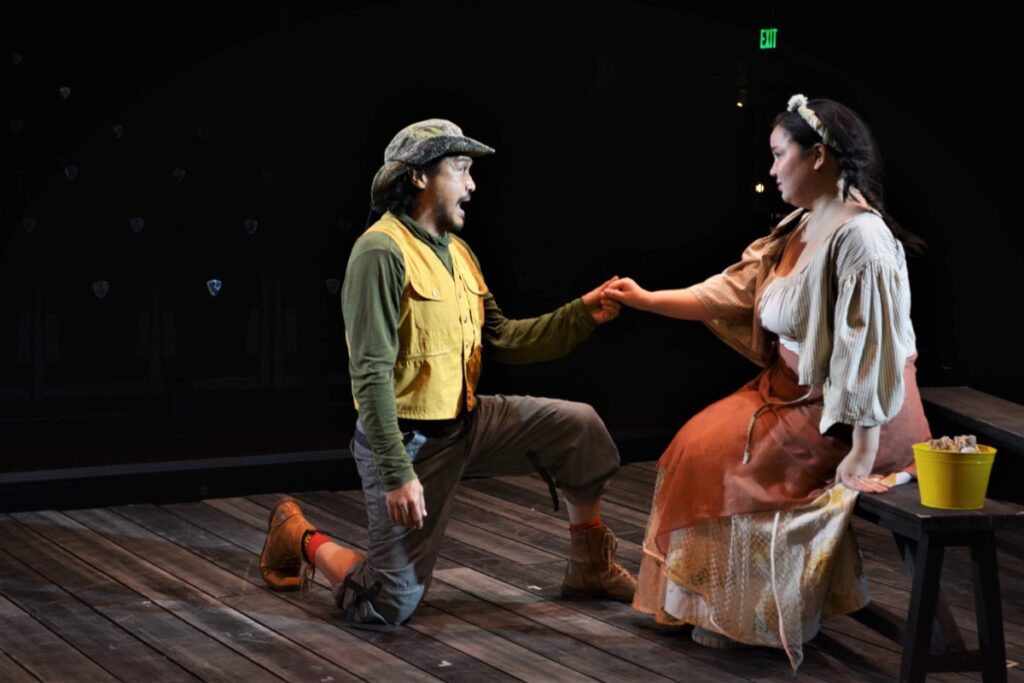
Or even in the aftermath of this clash, as Julie Jordan (Karylle Tatlonghari) tries to comfort Carrie by saying that there’s no “use in wond’ring if he’s good or bad; he’s your feller, and you love him, that’s all there is to that.” If this were advice given today, it certainly would’ve been met with contention. After all, we can’t just let a man (or anyone) be, even if they treat us badly, just because we love them. The female cast are all seen reading off scripts, as if to say, “this is just the idea being fed to me, I’m just repeating this.”
One thing this post-modern iteration has been unable to completely subvert, in this writer’s opinion, is the idea that someone can “hit you and not hurt at all.” It still is uncomfortable to see Billy Bigelow’s (Gian Magdangal) rough behavior towards Julie, and even to Mrs. Mullin (Roxy Aldiosa). One of the major points of conflict in the story is how, Billy, now married but jobless, has become more irritable and unhappy, to the point that he had hit Julie during an argument. While Julie explains it away as just a manifestation of Billy’s dissatisfaction with his situation, and that it “didn’t hurt,” it still leaves one wondering if that (and pure love) is truly acceptable as an excuse for being physically mistreated. (Nevertheless, red flag there.)
Undeniable talent
But despite the textual challenges, there is not a single instance of doubt about this tight cast’s skill, especially as most of them have to take on multiple roles.
Magdangal’s voice soars throughout the musical, showcasing vocal power and a range of emotions in “Soliloquy” and “The Highest Judge of All.” Tatlonghari, meanwhile, captures a sweet and playful Julie, that seamlessly transforms into vulnerability, most effectively through her gaze. It’s only a shame that some technical mic issues did not allow us to hear her magnificent singing as clearly in a few scenes.
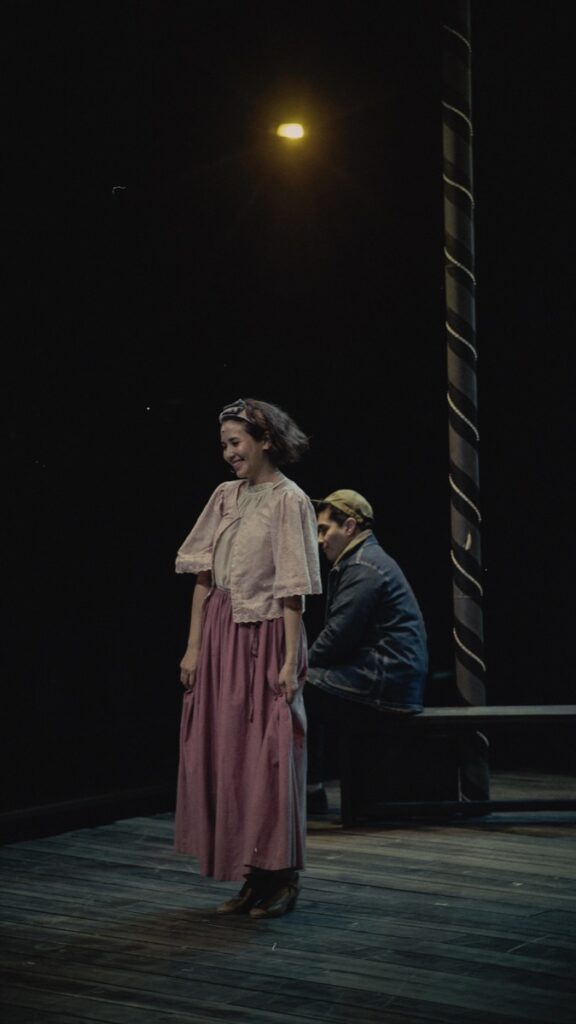
Bradshaw-Volante and Martinez meanwhile are a joy to watch, as they are impeccable at comedic timing and their portrayals of Carrie and Enoch make you just anticipate each moment they step on stage. They are the bright contrasts to the otherwise troubling dynamic of Julie and Billy.
Meanwhile, Gia Gequinto, a long-time artist under Ballet Philippines, showcased her superb dancing skills in her musical debut as Billy and Julie’s daughter Louise in “Carousel.” While her lines are few—and mostly towards the end of Act 2—her expressive movements are what draw eyes to her whenever she is in the scene. Her dance interludes capture the pain, frustration, and anger that her character faces, growing up haunted by her late father’s misdeeds.
The precise synchronization of the Starkeeper chorus, consisting of Bradshaw-Volante, Aldiosa, Mia Bolaños, Paula Paguio, and Cara Barredo, is also worth noting. While the original “Carousel” assigns only one person as the Starkeeper, REP’s post-modern version turns it into a female chorus, effectively adding to the ethereal mood at Billy Bigelow’s reckoning. (Also interesting for me to note, that the being/s meeting Billy on his day of judgment are played by women, especially after all the pain he had inflicted on women in his life on earth—Julie, Mrs. Mullin, and his daughter, Louise. Is this karma? We love to see it.)
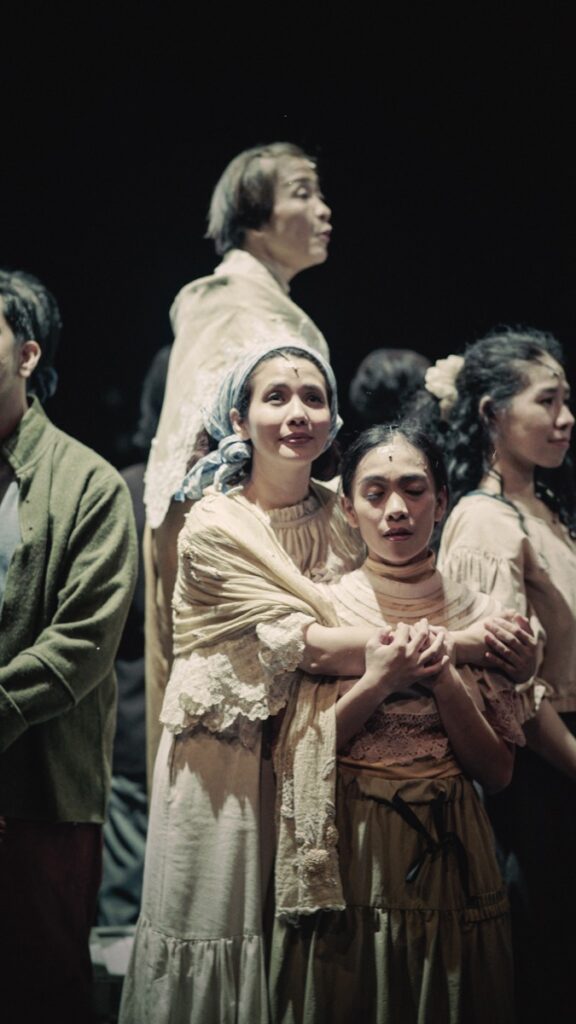
Questions remain
With “Carousel” being a decades-known classic, mounting the musical today proves to be a bold undertaking. And with REP poising this production as one that will put the admittedly dated material to the test, one really can’t help but have a few questions while watching.
While there are certain elements that change the interpretation of contentious scenes, it still makes one ask, “is this enough?” Is it enough to just raise the idea of how problematic some of these concepts are? And, knowing that it does touch on what are now considered sensitive (or unacceptable) issues, why still show it? Can we (or should we) still make space for stories with outdated ideals? And if we do, how? Or should we 21st-century creators even shoulder the burden of correcting the outdated political ideals of old work in the first place?
REP’s “Carousel” may well be a case study, showing us how much we can push without revising a work that isn’t totally ours to begin with, but making it workable and manageable.
At the end of it all though, this production shows that it’s not just material or text that we should put to the test, but ourselves, too.
“Carousel” runs until December 18 at the CCP Tanghalang Ignacio Gimenez.


